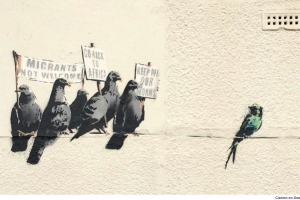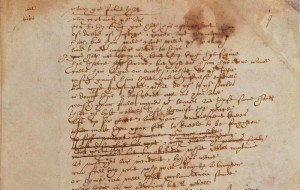The story of the week: in fact the story of the summer, has been the displacement of people from war-torn and impoverished parts of the Middle East and Africa to Europe. It’s been described as the biggest refugee crisis since World War 2. Britain has a long tradition of helping people fleeing their own countries: since 1930 there have been the Kindertransport of children from Nazi Germany, refugees from Hungary, the Vietnamese boat people and Ugandan Asians.
It has been going on much longer than that, as a new website with its own online database reveals. Englands Medieval Immigrants has found evidence of over 64000 named individuals known to have migrated to England between 1330 and 1550, during the period of the Hundred Years’ War and the Black Death, the Wars of the Roses and the Reformation.
The evidence they have uncovered shows that the people entering England come from many locations, including distant countries. “It is also clear that these people were drawn from a far broader variety of social and economic backgrounds than just the upper echelons on which modern research has concentrated.” What sources have they used to find this out? “The greatest, and most valuable, is undoubtedly the records of taxes paid by the alien population of England from the mid-fifteenth century onwards. From 1440, a series of specific taxes, known as the ‘alien subsidies’, were levied upon first-generation immigrants resident in most parts of England”.
It’s been estimated that aliens made up around 1% of the population, more like 6% in London. In one year alone, 1440, the names of 14,500 individuals were recorded at a time when the population of England was only two million. The records revealed “a relatively wide geographical dispersion of the immigrant population, with individuals appearing not only in the major towns, ports and other economic centres, but in villages and smaller settlements across the country.” Most people, wherever they lived, probably had some direct contact with these foreign nationals, and the project is revealing how much they integrated or clashed with English people. Professor Ormrod, who has been involved in the project, said “The research provides a deep historical context for modern debates about the movement of peoples and the state’s responsibilities to regulate immigration.”
The play The Book of Sir Thomas More contains a series of scenes covering the events of the May Day riots of 1517, within the period covered by this project. Immigrants from Lombardy in Northern Italy are being threatened by Londoners who accuse them of taking jobs and money from the locals, and want them to be deported back to where they came from. The same arguments were being put forward at the time the play was written, with respect to Huguenot migrants. The play was never completed and exists in manuscript form in the British Library. In a series of speeches written by Shakespeare, Thomas More makes the argument for the humane treatment of those forced to seek asylum by being expelled from their home land. It’s surely never been made more persuasively.
Grant them removed, and grant that this your noise
Hath chid down all the majesty of England;
Imagine that you see the wretched strangers,
Their babies at their backs and their poor luggage,
Plodding to the ports and coasts for transportation,
And that you sit as kings in your desires,
Authority quite silent by your brawl,
And you in ruff of your opinions clothed;
What had you got? I’ll tell you: you had taught
How insolence and strong hand should prevail,
How order should be quelled; and by this pattern
Not one of you should live an aged man,
For other ruffians, as their fancies wrought,
With self same hand, self reasons, and self right,
Would shark on you, and men like ravenous fishes
Would feed on one another….
Say now the king
Should so much come too short of your great trespass
As but to banish you, whether would you go?
What country, by the nature of your error,
Should give you harbour? go you to France or Flanders,
To any German province, to Spain or Portugal,
Nay, any where that not adheres to England,
Why, you must needs be strangers: would you be pleased
To find a nation of such barbarous temper,
That, breaking out in hideous violence,
Would not afford you an abode on earth,
Whet their detested knives against your throats,
Spurn you like dogs, and like as if that God
Owed not nor made not you, nor that the claimants
Were not all appropriate to your comforts,
But chartered unto them, what would you think
To be thus used? this is the strangers case;
And this your mountainish inhumanity.
Here is Sir Ian McKellen, who once played the part of Sir Thomas More, delivering these speeches. If you do not wish to hear his explanation and preamble, the speech begins around 2 mins 30 seconds in.
For those receiving this post by email, to see the video go to the full blog, to which you will find a link at the end of the post.




McKellen is one of our best ever – no question.
Thought-provoking and excellent prose, but I’m not sure it is correct to conflate the events of 500yrs ago with what is going on today.
In 1530 the population density of England was 23 per sq. km
Now it is – conservatively – 415.
Among countries with an area of over 100,000 sq. km this is the second densest population in the world.
Coincidentally, I was reading some of More’s work today, the vicious propaganda he wrote about Richard III – which we know is false through the paper written by Master of the Revels George Buck in 1622.
Rather than a pious humanist, it rather reveals him to be a sort of Tudor Alastair Campbell type character, doing his master’s bidding.
“……….Richard, the third son, of whom we now treat, was in wit and courage equal with either of them, in body and prowess far under them both: little of stature, ill featured of limbs, crooked-backed, his left shoulder much higher than his right, hard-favored in appearance, and such as is in the case of lords called warlike, in other men called otherwise. He was malicious, wrathful, envious, and from before his birth, ever perverse. It is for truth reported that the Duchess his mother had so much ado in her travail to birth him that she could not be delivered of him uncut, and he came into the world with the feet forward, as men be borne outward………with large gifts he got for himself unsteadfast friend-ship, for which he was glad to pillage and spoil in other places, and get for himself steadfast hatred. He was close and secret, a deep dissembler, lowly of countenance, arrogant of heart, outwardly friendly where he inwardly hated, not omitting to kiss whom he thought to kill; pitiless and cruel, not for evil will always, but for ambition, and either for the surety or increase of his estate. Friend and foe was much the same; where his advantage grew, he spared no man death whose life withstood his purpose. He slew with his own hands King Henry the Sixth, being prisoner in the Tower……..”
Quite sinister demonisation………one which our Will took as gospel!
http://www.thomasmorestudies.org/docs/Richard.pdf
Dear Sylvia
Thanks again for your terrific blog.
Other than the six signatures, Hand D is thought to be the only surviving example of Shakespeare’s handwriting. It would seem to be the work of an author refining his work rather than a (very poor) scribe. But Shakespeare’s actor friends Heming and Condell attested in the First Folio that they never saw him blot a line. It’s hard to know what Jonson means when he notes their observation:
I remember, the Players have often mentioned it as an honour to Shakespeare, that in his writing, (whatsoever he penn’d) hee never blotted out line. My answer hath beene, would he had blotted a thousand.
This would seem to be yet another a case where there is no satisfactory orthodox explanation to a mystery surrounding Shakespeare. Though Shakespeare must have produced thousands of draft pages, amazingly, our only surviving composition is littered with blottings and crossings-out in direct contradistinction to the testimonial evidence.
The only argument I’ve heard from people who believe Shakespeare of Stratford is the true author is that he didn’t write Hand D. But this is just avoiding the issue.
Very interested to hear of other possibilities around this question.
Best wishes
Bruce
The idea that Shakespeare never blotted a line was no doubt an exaggeration brought about by giving actors only fair copies. The Thomas More MS is clearly a working draft.
Mozart was equally reputed never to have altered his manuscripts, but even a superficial look shows this to be incorrect. Two string quartets in B flat K 172 and the G major K 387 show additions and subtractions as his is working.
So the belief that a couple of scratched out lines from a draft somehow proves that Shakespeare of Stratford wasn’t the author of his plays doesn’t stand up to scrutiny.
Thanks Sylvia for your wonderful blogs, I know how hard you work on them.
You’re surmising that Shakespeare’s colleagues of twenty years only saw fair copies of the plays. This would suggest that Shakespeare never refined his scripts in rehearsal – e.g. in response to actor’s suggestions, capabilities, different theatre dimensions, props or costume constraints – i.e. the spontaneous improvising situations that theatre companies wrestle with every day. Or, if the two actors are exaggerating with this absolute claim, he made corrections so rarely that it was noteworthy (of course this idea of exaggeration is entirely conjectural).
Jonson fails, or at least does not try too hard, to clarify the situation.
There’s very little testimonial evidence about Shakespeare (mostly from Jonson) and so much (all?) of it is questionable.
Thanks for your response. By the way, I wouldn’t call this proof of anything. I call it a question; one of the many valid Shakespeare Authorship questions.
Quite right. Sorry.
Thanks for this post Sylvia, I had not heard this before and it so fits the situation we find ourselves in today. Shakespeare truly was ‘a man for all time’.
Thank you for this post Sylvia. We seem to have wandered off the point though via assessment of More, Richard III, and whether Shakespeare blotted his copy.
I’m with Jan. This is a potent and relevant speech about how we may treat our fellow human beings; and beautifully introduced and performed by Sir Ian McKellen